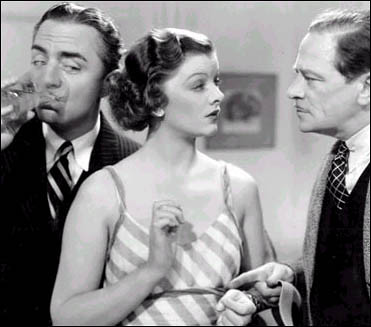Apparently, if you’re an executive at Warner Brothers, you get exactly the right ingredients to remake one of old Hollywood’s most sparkling jewels, namely 1934′s superlative and surprisingly enduring comedy-mystery The Thin Man. The film, for those of you who don’t know, is based on a novel by the great Dashiell Hammett, and centres around a wealthy, witty, hard-drinking married couple who end up entangled in a murder mystery during a Christmas visit to New York. Johnny Depp (for it is he) has been dragging his pitch for a remake around Tinseltown for a while now, and it seems as though the project is finally getting off the ground, with release tentatively scheduled for 2013, although given Depp’s committment to the PotC franchise, this date might well get pushed back. UPDATE: It was. Deadline reports that the movie is been flung into production deep freeze. And the gods rejoiced.
 |
| There's a mystery in there somewhere amongst the martinis |
And then there’s Depp himself, increasingly reliant on his Jack Sparrow persona. You can’t coast along on quirky half-smiles forever, especially when you’re setting yourself up against one of cinema’s most winning performances. ‘William Powell is to words what Fred Astaire is to dance’ is Ebert’s verdict on the man who was an entire generation’s image of urbane sophistication, knocking back endless cocktails whilst solving baffling mysteries without breaking a sweat. And all achieved with a delicate balance of wit, cynicism and charm. That’s a pretty tall order for a man who seems to be running out of steam. This might be the challenge he needs to get himself back on track, but I’m unconvinced. The last time he tried to move away from his eccentric image the result was the underwhelming Public Enemies, and unless he finds a pretty spectacular actress to play the other half of the story’s husband-and-wife detective team (my pick would be Reese Witherspoon), I can’t see how he will generate the energy needed to pull the whole thing off. The role, to my mind, would be better suited to someone like Robert Downey Jr., who has the required urbane charisma and, as a plus, is freshly back at the top of his career.
 |
| Pictured: doing it right |
The problem, of course, does not lie with the concept of a remake itself, which is as old as the hills. In fact, Classic-era Hollywood was possibly even more shameless when it came down to revamping old material – another of Hammett’s novels, The Maltese Falcon was adapted three times between 1931 and 1941 (and critical opinion seems to agree that they only got it right the last time). And his magnum opus The Glass Key was first immortalised on screen in 1935 until some smart executives figured there was still life in the old dog and promptly bashed out a 1942 rehash (which, it is worth noting, was once again garnered much better reviews than the first attempt).
The problem with Depp’s vision is that there is no visible answer to the vital question: What is the point? It isn’t that, like the examples mentioned above, the original was a flawed effort at capturing great material. The Thin Man is still highly regarded by critics and popular amongst film fans, and some, including this observer, would say it even improves on the book. Alternatively, a remake’s interest can lie in the fact that it reimagines an old story in a different setting (think Kurosawa’s Seven Samurai translated to the Wild West as The Magnificent Seven, countless Shakespeare adaptations). However, Depp apparently plans on keeping the story’s 1930s setting. Whilst this comes as a relief (attempting to pass off the lifestyle of interwar New York high society as modern day would have been a grisly spectacle indeed), it also reminds us that Depp really doesn’t seem to be bringing anything new to the table. This approach never works, as epitomised by Gus Van Sant’s spectacularly pointless 1998 shot-for-shot remake of Psycho, which proved it is possible to copy a masterpiece with complete accuracy and yet still fail to capture one iota of the original’s brilliance.
 |
| And the world said 'just...no.' |
Lest I be accused of simply booing blindly from the sidelines, I will almost certainly be going to see the Depp reboot if and when it makes it to cinemas. But it will be with the sort of guilty, transfixed voyeurism one associates with a particularly eye-catching road accident. The best thing I can say about the project at this moment is that bad remakes tend to sink reassuringly without trace (case in point: 2008′s blood-curdling assault on The Women, made in 1939 yet still one of the most genuinely funny films you’ll ever come across). And hopefully, it will encourage people to dig up a copy of the original (and its highly enjoyable sequels) and get acquainted with one of cinema’s most perfect examples of pure entertainment.
(note: this blog post also appears in the online edition of The Oxford Student)
No comments:
Post a Comment